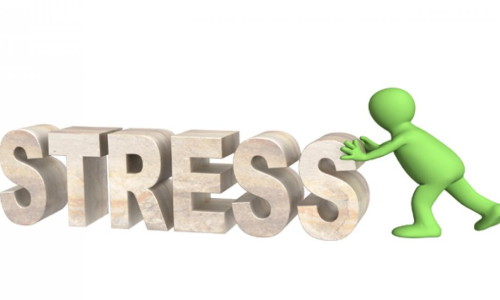Perception of stress defines how it impacts you

A child preparing for examinations feels stressed out. It is likewise with employees slogging in the office for extra hours, a businessman coping with the market experiences and a woman running the day-to-day chores if she has to do something extra. Thus, stress is a ubiquitous phenomenon. Everyone explores ways and means to overcome it and invents measures to overcome it.
A child preparing for examinations feels stressed out. It is likewise with employees slogging in the office for extra hours, a businessman coping with the market experiences and a woman running the day-to-day chores if she has to do something extra. Thus, stress is a ubiquitous phenomenon. Everyone explores ways and means to overcome it and invents measures to overcome it.
How do you define stress? Perhaps, it is easy to experience the strange phenomenon than trying to define it for the simple reason; stress is not uniform and varies from person to person. What could be stressful to you may not be so for me.
The Oxford English Dictionary defines stress as ‘a state of mental or emotional strain or tension’ resulting from adverse or demanding circumstances. But, then again what is adverse or demanding also varies from individual to individual. For me reading physics was demanding whereas studying chemistry was never an adverse experience.
Therefore, one way to come out of stress is to do something, which you feel is not demanding. Of course, it may not be possible for everyone every time. Stress is associated with health issues like anxiety disorders. A woman having a nagging husband is most likely to be susceptible to asthma caused by Battered Women Syndrome.
Stress can also lead to a host of psychosomatic disorders like headache, high blood pressure and even cardio-vascular problems. People resort to addictions like smoking and drinking to be relieved of stress, giving a damn to the health complications that they will develop over a period of time. Therefore, you have to invent healthy forms of overcoming stress.
Explore what interests you to break from the mundane. It again varies from person to person. I have seen many getting relieved of work or study-induced stress by watching films. When I tried to follow cue, I felt more stressful. For me seeing an intellectually stimulating discussion on television or reading an article of similar nature in a newspaper relieves the stress.
For a perverted human being, watching a semi-clad heroine on the small screen may reduce stress. But after an excruciating day’s work, when my daughter greets me late in the evening, I get relieved from the work-induced stress.
In fact, the way you get out of stress also speaks about your personality. You are the best judge of identifying something that interests you, but, it should be a healthy thing. Modern life and profession inevitably exposes you to stress. Competition, levels of aspiration, peer-problems make for a common stressed out experience.
As you succeed in life, you will undergo more stress given that it will directly reflect on your abilities to raise the bar. After all, you cannot run away from a productive career. But, research suggests that the level of stress one undergoes by doing something is also related to one’s perception of stress.
Therefore, stress can be both positive and negative. Positive stress improves your performance and will not damage you. But a negative one will be disastrous and affect you physically and psychologically. A study by Alia Crum of Stanford University Mind and Body Lab and others found that seeing stressors as challenges rather than threats invites physiological responses that improve thinking and cause less physical wear and tear. Attitudes and beliefs shape physical responses to stress.
Quoting several researches, The Economist (July 23 2016) in an article, ‘Stress What Makes Us Stronger’, states that recognising the benefits of stress can cause measurable improvements in performance. Shawn Achor, the author of ‘The Happiness Advantage’, suggests that stress at work may be performance enhancing but should be followed by a reasonable amount of physical and mental rest.
A busy professional taking a day off and staying home will experience a different kind of stress. The longing for work makes even leisure stressful. As stress is an inseparable component of one’s life, especially for those who are more productive and successful, finding ways to reduce, if not overcome it becomes more important.
Your attitude to work defines stress. Developing the right kind of attitude to your profession is the first solution. Pleasure in job keeps stress away. Accepting challenges and perceiving them as helpful for your own progress would help you accept stress as a pleasant experience.
Time management expert, David Allen says that much of the stress, which people feel, does not come from having too much to do. It comes from not finishing what they’ve started. Keeping yourself out of stress by avoiding last minute rush to do things is a workable alternative.
Prioritising and integrating your work can also reduce stress. This is certainly the age of multi-tasking. I teach, I deliver speeches at public platforms as a former legislator and I write as a journalist. It is certainly stressful.
The simple solution I found is to integrate all this to relieve the stress and make the work more productive. Recently, I wrote an edit on the Goods and Services Tax (GST). I spoke on the subject on television. I delivered a lecture on the GST in a seminar. I lectured on it for civil servants. How to report on a subject like GST was the topic of my class for journalism students.
Such an integrated approach not only reduces stress but even enhances your productivity manifold. But too many things at work can increase stress. The American philosopher and psychologist William James rightly suggests that the greatest weapon against stress is our ability to choose one thought over another.
Always remember, unproductive work is more stressful. As the Jamaican musician Ziggy Marley said “Doing something that is productive is a great way to alleviate emotional stress. Get your mind doing something that is productive.”















